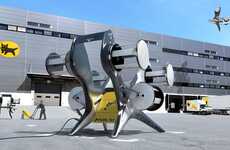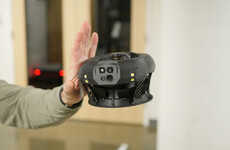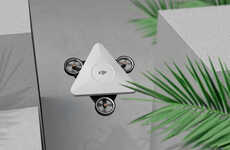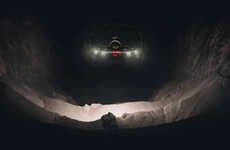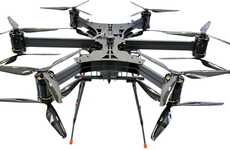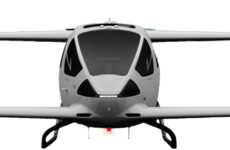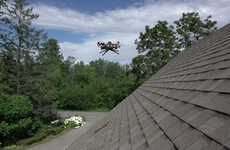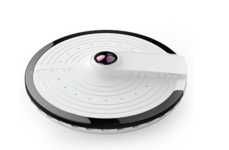
The 'Omnicopter' Drone Can Fly Through All Six Degrees of 3D Space
References: flyingmachinearena.org & cnet
Standard four-rotor drones are impressive, as any unmanned aerial vehicle is, but the 'Omnicopter drone' from researchers at ETZ in Zurich, Switzerland, solves the limitations that stymie typical drones. While any drone can fly through four degrees of 3D space (i.e. vertically upwards and downwards and horizontally side to side), the Omnicopter drone uses eight rotors, each placed at unique angles, that allows it to rotate its body and fly through six degrees of 3D space.
The key to the cubic Omnicopters range of motion is in both the placement and capability of its rotors. Each rotor is pointed in a different direction along the x, y, and z, axes, and each rotor can switch the direction of its spin mid-flight. These features allow the Omnicopter drone to fly in complete novel formations.
The key to the cubic Omnicopters range of motion is in both the placement and capability of its rotors. Each rotor is pointed in a different direction along the x, y, and z, axes, and each rotor can switch the direction of its spin mid-flight. These features allow the Omnicopter drone to fly in complete novel formations.
Trend Themes
1. Omni-directional Flight - The development of drones with the ability to fly through all six degrees of 3D space opens up opportunities for new applications requiring precise maneuverability.
2. Multi-axis Rotors - The use of rotors pointed in multiple directions and capable of switching spin direction during flight presents possibilities for advanced control and stability in drone technology.
3. Novel Formation Flying - The capability for drones to fly in unique formations due to their omni-directional flight capabilities creates potential for synchronized aerial displays or collaborative tasks.
Industry Implications
1. Aerospace - The aerospace industry can explore the use of omni-directional drones for applications such as search and rescue missions in complex and confined spaces.
2. Film and Entertainment - The film and entertainment industry can leverage drones with multi-axis rotors to capture dynamic and immersive aerial footage from various angles and viewpoints.
3. Construction and Engineering - The construction and engineering sector can benefit from drones with novel formation flying capabilities for tasks such as surveying, inspections, and construction site monitoring.
3
Score
Popularity
Activity
Freshness


